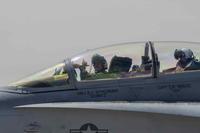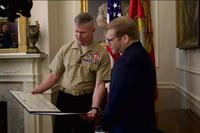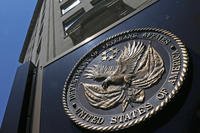 Rummy went to the National Press Club yesterday, and answered some questions. Am I the only one that found his responses kind of lame?
Rummy went to the National Press Club yesterday, and answered some questions. Am I the only one that found his responses kind of lame?
Check out the Defense Secretary on the Pentagon's efforts to keep tabs on home-grown peace groups, for example. First, he says he didn't know anything about it. Then he says it was "perfectly understandable." Then he invokes 9/11, and the prevetion of sabotage. Finally, he concludes, the whole thing is "no big deal."
SALANT: This questioner writes about a recent report about the Defense Department monitoring antiwar protesters and wants to know why the Defense Department is doing that.
RUMSFELD: Well, I wasn't aware of it at all, but it turns out that -- this is no surprise to anyone here -- the Department of Defense has the responsibility in the United States for force protection. We don't have the responsibility for homeland security. That's with the Department of Homeland Security.
We do have the responsibility, however, to protect our own forces. And apparently, what took place was a perfectly understandable thing.
They decided that the way -- given the assignment to do that -- they decided to establish a program whereby they would be able to observe and do the kind of countersurveillance to see who was taking pictures of military installations or sensitive activities, and who was observing them, and gather information of that type, so that we would not be accused of failing to protect our forces and their families and the military installations in the country. And so, they began this process.
According to the people who briefed me on it, to do that, you obviously end up scooping up information, whether it's names or films, or whatever, to protect your base. And that information then comes into a data bank.
And, you know, think of 9/11. Everyone accused the government of not connecting the dots. You didn't connect the dots before the fact, and you weren't able to stop it.
So, here they are trying to connect the dots, and someone looks at it and says, oh, my goodness gracious! Isn't that terrible! You're collecting information on people in the United States.
And, of course, if you look at it, that's what it is. It's information about people who are physically in the United States, who were observing a base in some way. And so, they put in some new rules whereby the people doing this have to purge the system periodically, so we don't end up with massive data that we don't need and don't want and didn't intend to keep in the first place.
And they then review what there is and see, is there a threat to that base of some kind? Is there something that should be turned over to the FBI?
And it's no different, in a sense, than a private business that has a building or a factory or facility, and has a security force, and they have surveillance of it to see who's looking at it and what's being done.
But because of the sensitivity of it, obviously, it became a big cause celebre, and I think -- at least I'm told -- that they now think they've put in place the kinds of procedures, so that the information that's gathered will not become a permanent record, and will be purged appropriately. And to the extent they connect any dots, they obviously turn them over to the FBI, or whoever local law enforcement, if they're concerned about some security.
In short, it's no big deal...
But, as bad as he fumbled this question, I found this answer to even worse:
QUESTION: A lot of questions about Iraq. First one from this questioner.
What do you say to a young G.I. on his or her third tour of duty in Iraq?
RUMSFELD: Well, first of all, G.I., if you mean by that a soldier, Army, there are to my knowledge no Army people who are back for their third one-year tour that weren't volunteers.
First of all, everybody in the military today is a volunteer.
So, the first thing I would say, though, to them is, thank you for volunteering. Thank you for deciding you wanted to serve the country. Thank you for putting up your hand and say, send me.
The tour lengths are quite different. The Army has a year -- up to a year -- in Iraq. The Marine Corps has seven months, up to seven months. The Navy deployments tend to be six months in and 12 months back.
The Air Force differs widely. Some are a year. Some are three months rotation where they go back in frequently.
But anyone who's there on a third tour for a year, you can be absolutely certain volunteered. And I say, thank you for volunteering.








